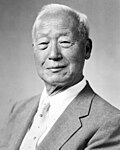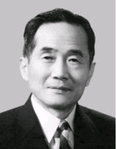
Syngman Rhee was a South Korean politician who served as the first president of South Korea from 1948 to 1960. Rhee is also known by his art name Unam. Rhee was also the first and last president of the Provisional Government of the Republic of Korea from 1919 to his impeachment in 1925 and from 1947 to 1948. As president of South Korea, Rhee's government was characterised by authoritarianism, limited economic development, and in the late 1950s growing political instability and public opposition.

Yun Posun was a South Korean politician and activist who served as the second president of South Korea from 1960 to 1962. He was the only president of the parliamentary Second Republic of Korea.

Presidential elections were held in South Korea on 19 December 2002. The result was a victory for Roh Moo-Hyun of the ruling Millennium Democratic Party, who defeated Lee Hoi-chang of the Grand National Party by just over half a million votes.

The first Republic of Korea was the government of South Korea from August 1948 to April 1960. The first republic was founded on 15 August 1948 after the transfer from the United States Army Military Government that governed South Korea since the end of Japanese rule in 1945, becoming the first independent republican government in Korea. Syngman Rhee became the first president of South Korea following the May 1948 general election, and the National Assembly in Seoul promulgated South Korea's first constitution in July, establishing a presidential system of government.

The April Revolution, also called the April 19 Revolution or April 19 Movement, were mass protests in South Korea against President Syngman Rhee and the First Republic from April 11 to 26, 1960, which led to Rhee's resignation.

The second Republic of Korea was the government of South Korea from April 1960 to May 1961.

Chang Myon was a South Korean statesman, educator, diplomat, journalist and social activist as well as a Roman Catholic youth activist. He was the only prime minister of the parliamentary Second Republic. In addition, during the First Republic he was the fourth and last vice president of South Korea. His art name was Unseok (운석). His English name was John Chang Myon.

Parliamentary elections were held in North Korea on 25 August 1948 to elect the members of the 1st Supreme People's Assembly. Organised by the People's Committee of North Korea, the elections saw 572 deputies elected, of which 212 were from North Korea and 360 from South Korea.

Parliamentary elections were held in North Korea on 27 August 1957 to elect members of the 2nd Supreme People's Assembly. Voters were presented with a single list from the Democratic Front for the Reunification of the Fatherland, dominated by the Workers' Party of Korea.

Parliamentary elections were held in North Korea on 8 October 1962 to elect the members of the 3rd Supreme People's Assembly. Only one candidate was presented in each constituency, all of which were selected by the Workers' Party of Korea, although some ran under the banner of other parties or state organisations to give the illusion of democracy. Voter turnout was reported to be 100%, with all reportedly voting in favour of the candidates presented.
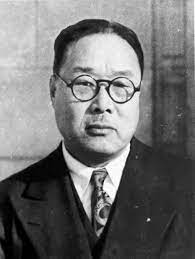
Yi Yun-young was an independence activist, educator, and Methodist minister during the Japanese occupation of Korea. His family clan originated in Danyang, and he was from Yongbyon in Pyonganbuk-do. His art name was Baeksa. During the March 1st Independence Movement, he was arrested for holding a lecture declaring independence and protesting against the Japanese occupation. In 1940, his pastoral qualifications were suspended because he opposed the unification of the churches in Korea and Japan and refused to adapt Sōshi-kaimei. After the Liberation, he participated with Cho Man-sik in the Committee for the Preparation of Korean Independence, founded the Korean Democratic Party, and was active as the party's vice leader. After his escape to the South, he was recommended as acting Prime Minister. After the establishment of Korea's government, he was named to be the first prime minister, but he was defeated because of the rejection of his confirmation by the Korea Democratic Party. After that, he was named to be the prime minister three more times, but each time he was rejected. Being one of Syngman Rhee's closest allies, he served as Minister without Portfolio and Minister of Social Affairs during the First Republic. He ran for vice president representing the anti-Lee Ki-poong faction but was defeated. After the May 16th Coup, he was Chairman of the Committee for Struggle against the prolongation of Military Government and executive member of the People's Party. He was an aide of Cho Man-sik, then after he defected to the South, he worked as an aide to Syngman Rhee.
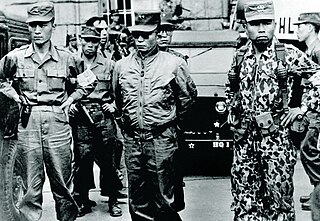
The May 16 military coup d'état was a military coup d'état in South Korea in 1961, organized and carried out by Park Chung Hee and his allies who formed the Military Revolutionary Committee, nominally led by Army Chief of Staff Chang Do-yong after the latter's acquiescence on the day of the coup. The coup rendered powerless the democratically elected government of Prime Minister Chang Myon and President Yun Posun, and ended the Second Republic, installing a reformist military Supreme Council for National Reconstruction effectively led by Park, who took over as chairman after General Chang's arrest in July.

Presidential and vice-presidential elections were held in South Korea on 15 May 1956. The result was a victory for Syngman Rhee, who won 70.0% of the vote. Voter turnout was 94.4%.

Parliamentary elections were held in South Korea on 29 June 1960. They were the first and only direct elections of the Second Republic and saw the first election of members of the new House of Councillors, together with the fifth election of members of the House of Representatives. They were also the first relatively free and fair national elections held in the country, but would be the last free elections until the 1987 presidential elections. Voter turnout was 84.3%.
Indirect presidential elections were held in South Korea on 12 August 1960, which saw the election of Yun Posun as President of the Republic of Korea, a ceremonial political position in the Second Republic. Held after the April Revolution which had forced the resignation of Syngman Rhee, it was the only presidential election to be held during the short era of the Second Republic, as the Republic folded after Park Chung-hee's May Coup the next year. The election was indirect, with a joint session of the House of Commons and Senate, which had been elected in July, acting as the electors. The winning candidate required the assent of two thirds of the members of both houses.
Presidential and vice- presidential elections were held in South Korea on 20 July 1948, following the Constitutional Assembly elections in May. The president was to be elected by the members of the National Assembly, as instructed by the 1948 Constitution. Of the 198 members of the National Assembly, 196 were present for the vote. A candidate required two-thirds of the votes cast to win. Syngman Rhee was elected with 180 votes, and took over the government to oversee the transfer of power from the United States Army Military Government in Korea.
The Daegu Democracy Movement broke out February 28, 1960, ahead of the March 1960 South Korean presidential election during the period of Syngman Rhee's government, in resistance against his Liberal Party's dictatorship. After this movement, the 3.15 Masan democracy movement broke out, and the Daegu Democracy Movement became the main cause of the April Revolution.
Parliamentary elections were held in Hungary on 25 and 26 January 1920. However, they were only held in 164 districts. After the Treaty of Trianon was signed, the 44 districts previously occupied by Romania voted between 13 June and 5 July, whilst the 11 districts occupied by Serbia did not vote until 30 and 31 October 1921. The election was held with compulsory voting. In protest at this and other changes to the franchise that left 60% of the voting age population unable to vote, the Hungarian Social Democratic Party boycotted the elections, and called for its supporters to cast invalid votes, resulting in an unusually high number of blank or invalid votes – 12% in the January elections and over 20% in Budapest and other major cities.
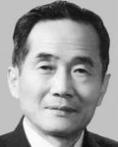
Lee Ki-poong was a South Korean politician and Vice President elect. He was the Minister of National Defense and Mayor of Seoul. He was the leader of Liberal Party and supporter of Syngman Rhee. By the 1954 election, Lee became the most prominent member of the Liberal Party. The Liberal Party held power from 1948 to 1960.

The Democratic Party was a political party in South Korea. The party was the first truly organized liberal opposition against Syngman Rhee's conservative Liberal Party, and is considered as the predecessor to the lineage of the South Korean liberal parties.
